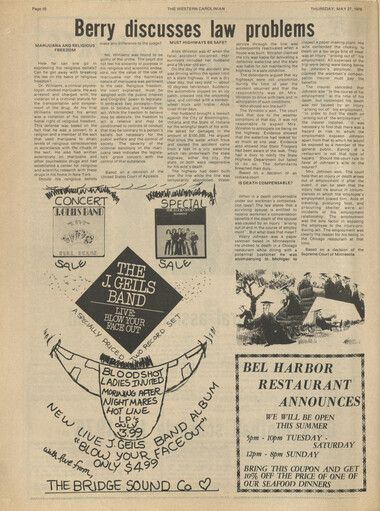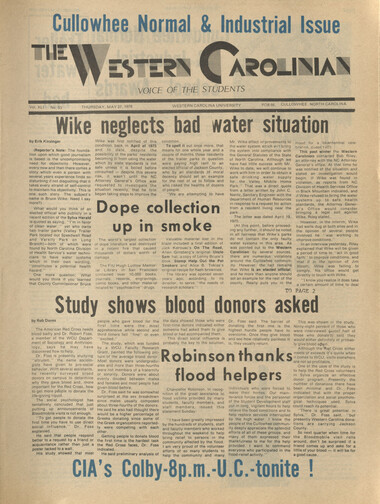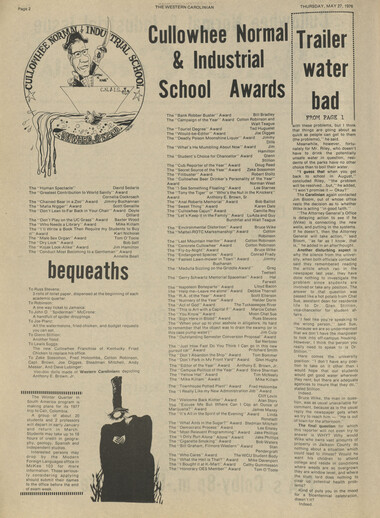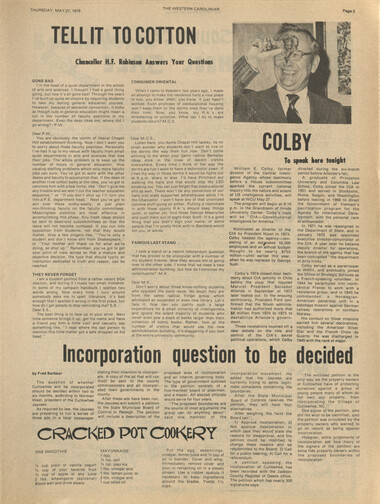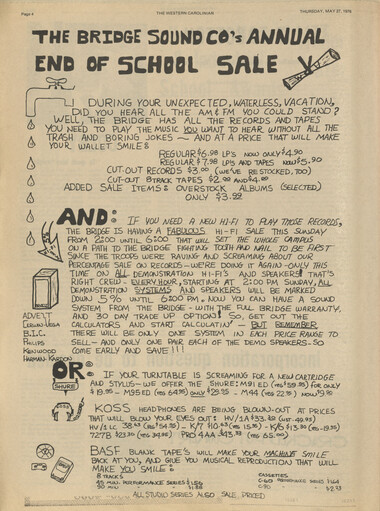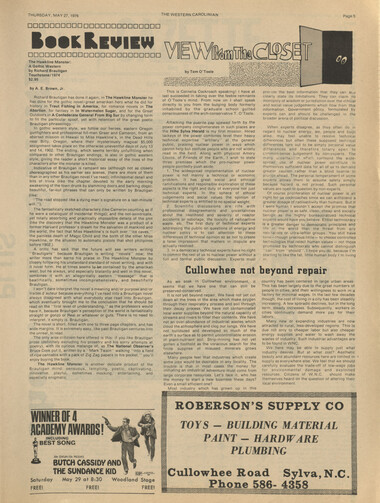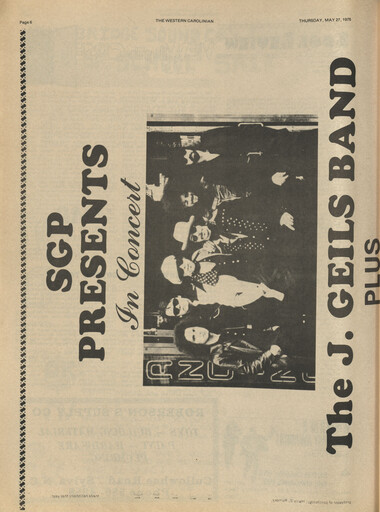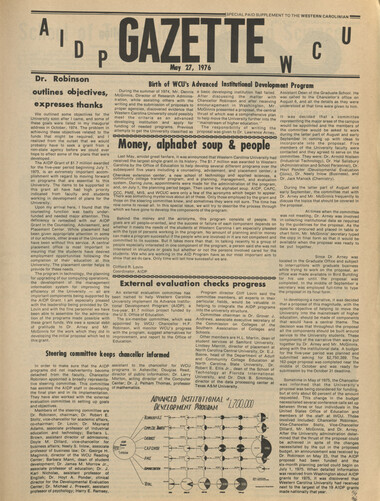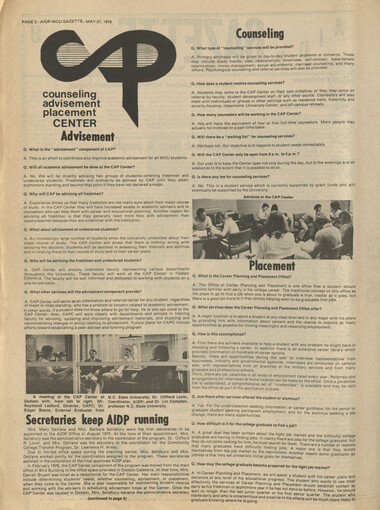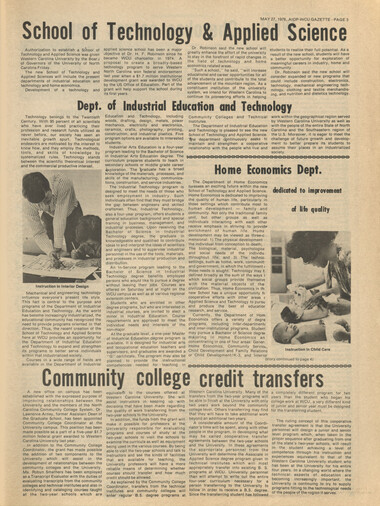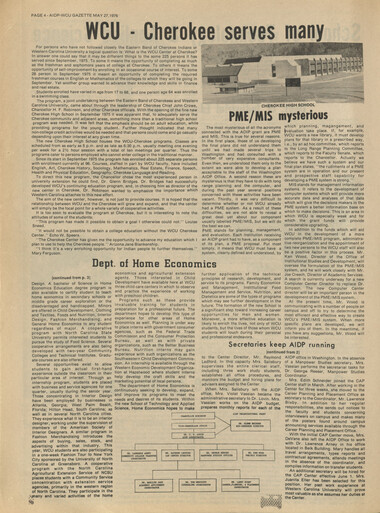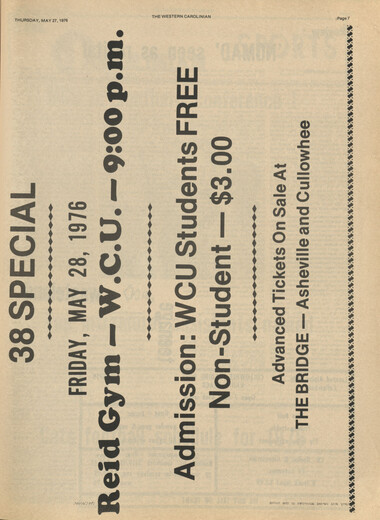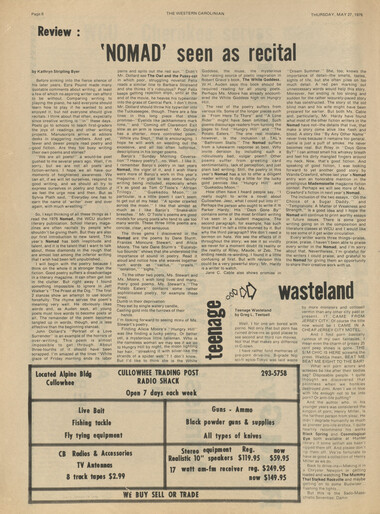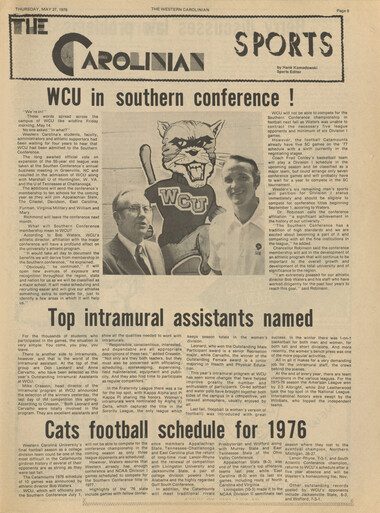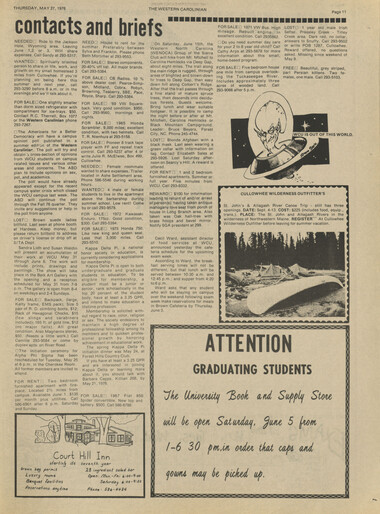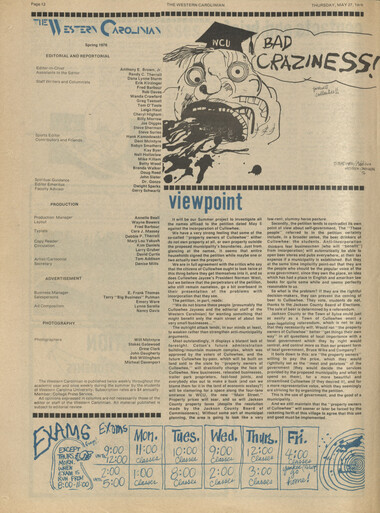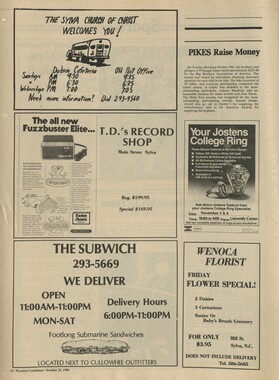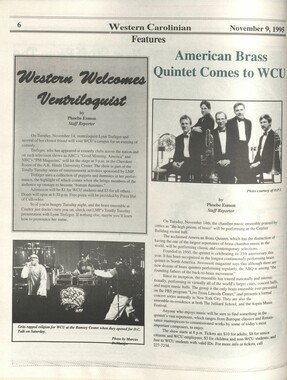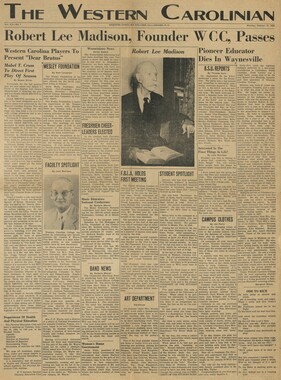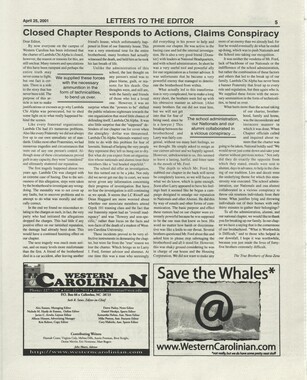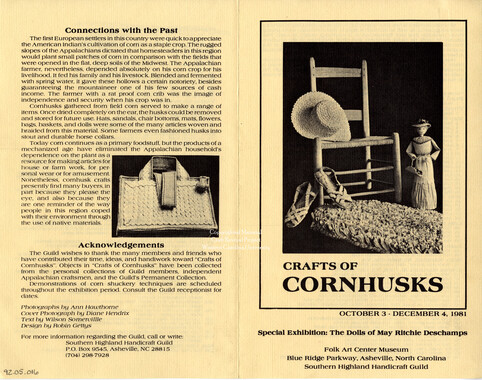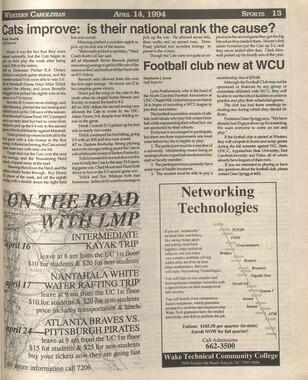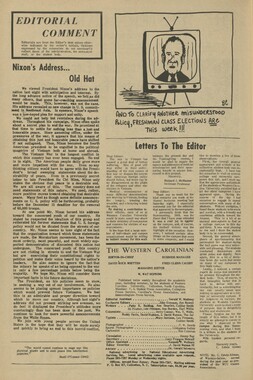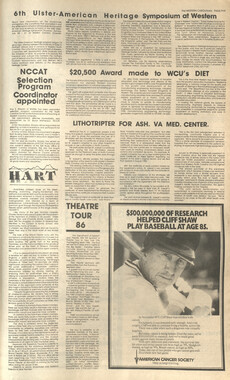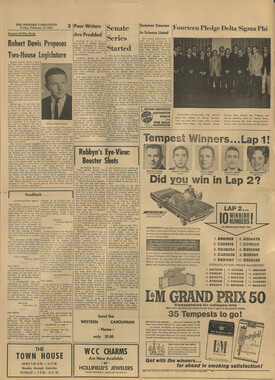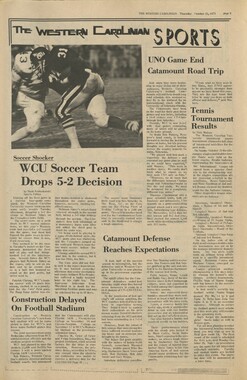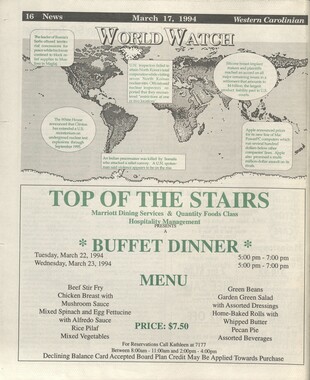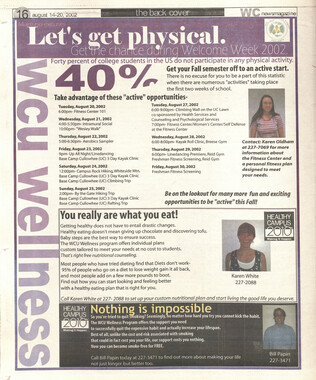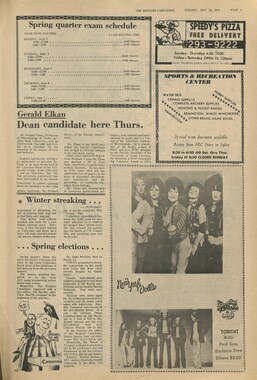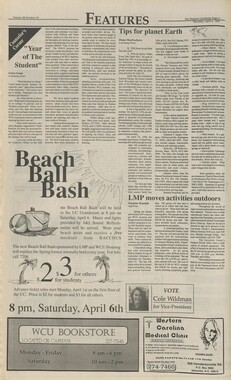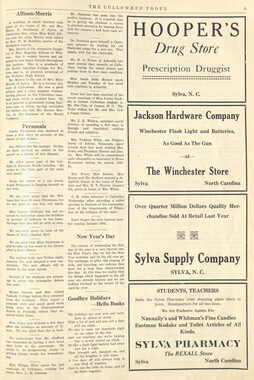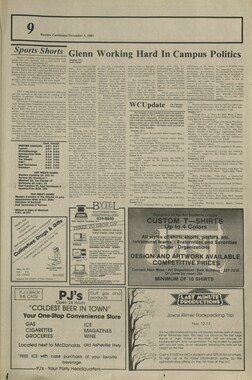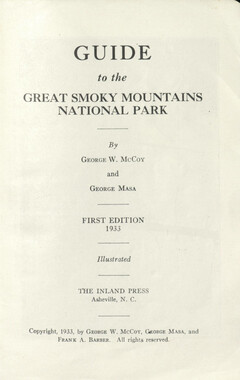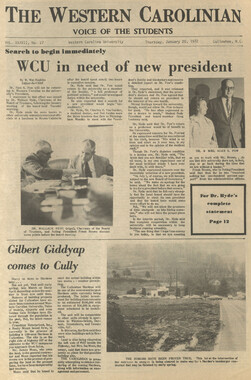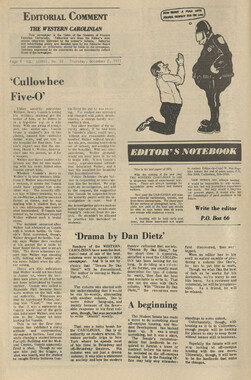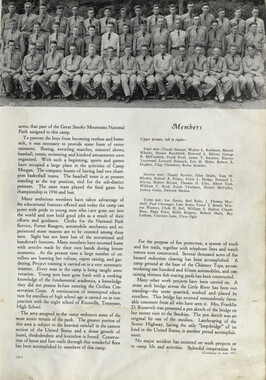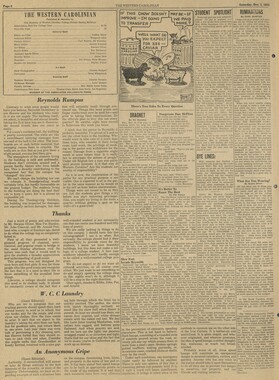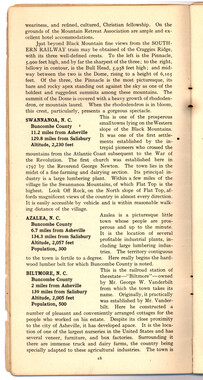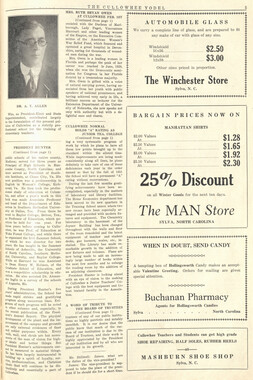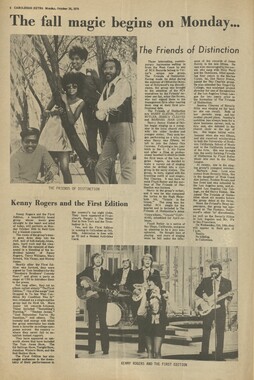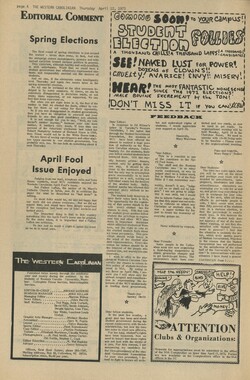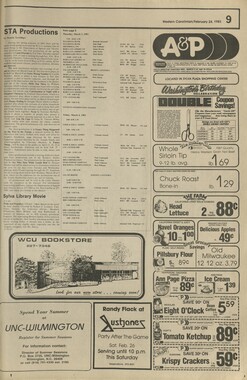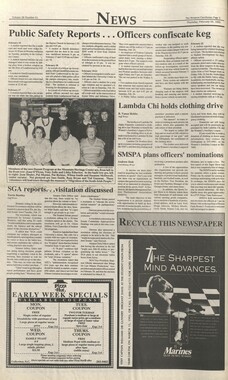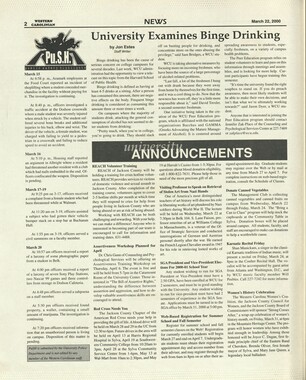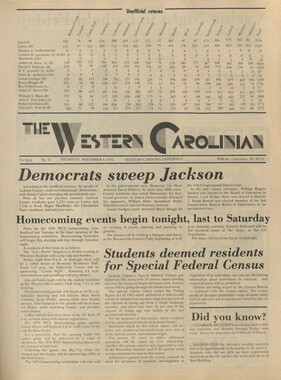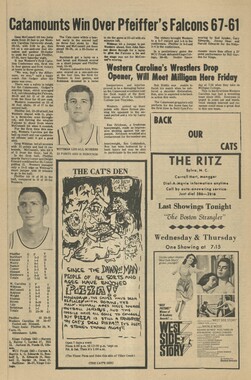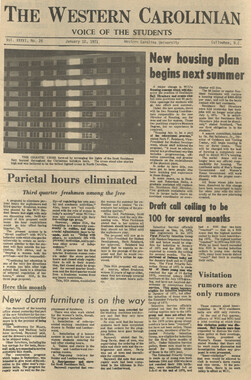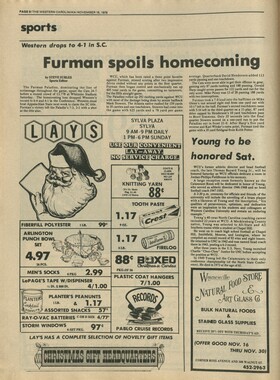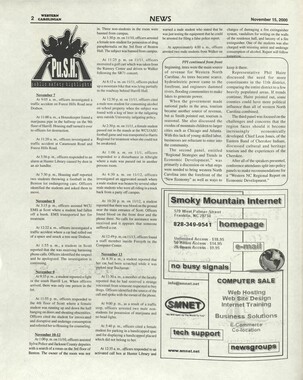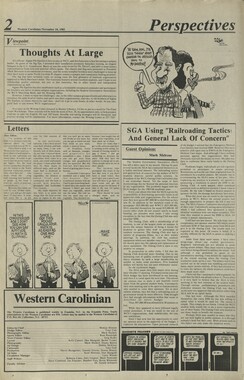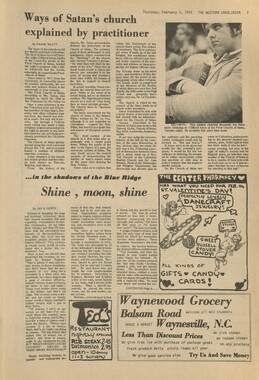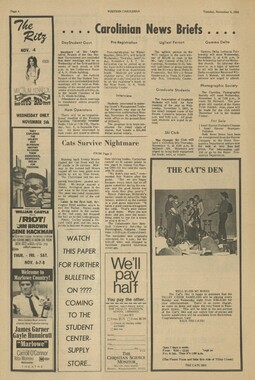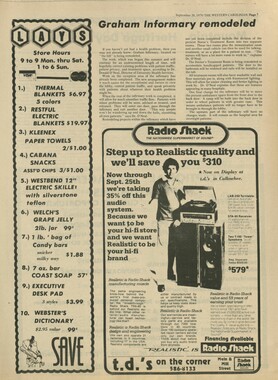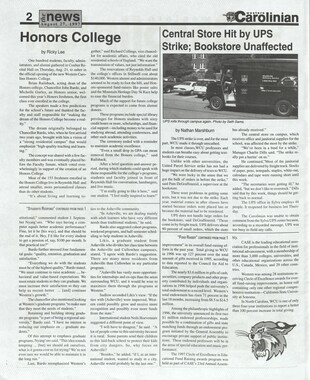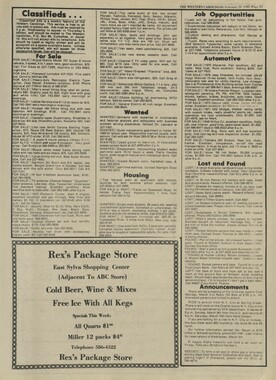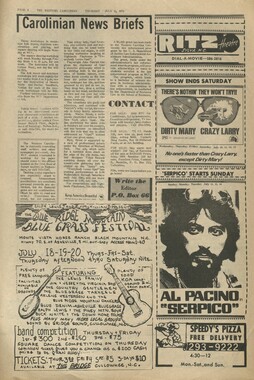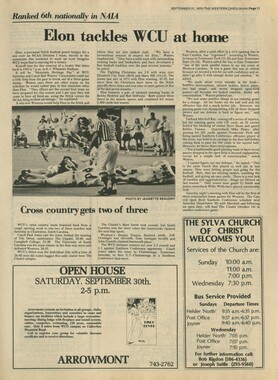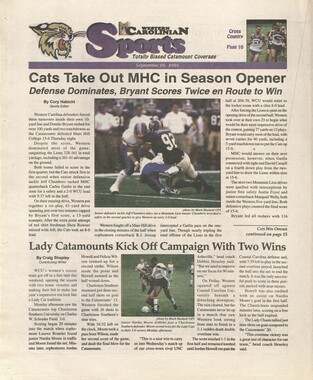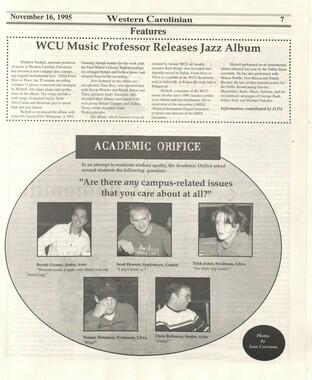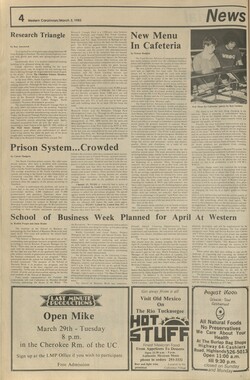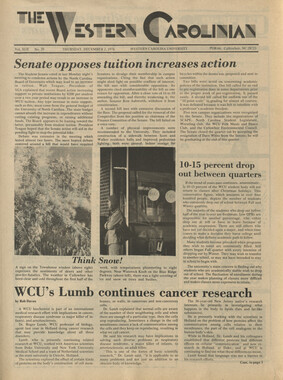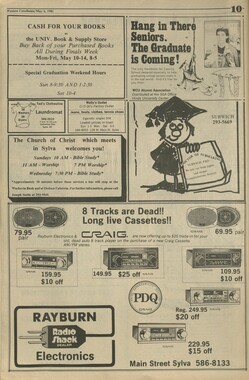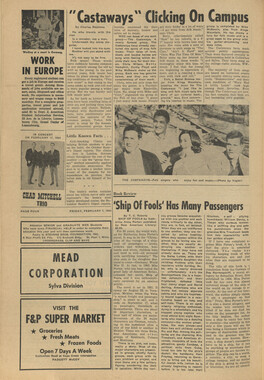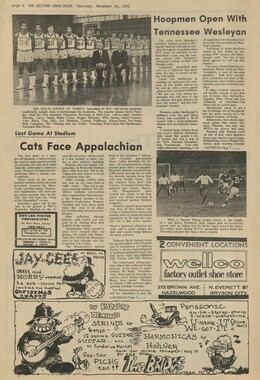Western Carolina University (20)
View all
- Canton Champion Fibre Company (2308)
- Cherokee Traditions (291)
- Civil War in Southern Appalachia (165)
- Craft Revival (1942)
- Great Smoky Mountains - A Park for America (2766)
- Highlights from Western Carolina University (430)
- Horace Kephart (941)
- Journeys Through Jackson (154)
- LGBTQIA+ Archive of Jackson County (85)
- Oral Histories of Western North Carolina (314)
- Picturing Appalachia (6772)
- Stories of Mountain Folk (413)
- Travel Western North Carolina (160)
- Western Carolina University Fine Art Museum Vitreograph Collection (129)
- Western Carolina University Herbarium (92)
- Western Carolina University: Making Memories (708)
- Western Carolina University Publications (2283)
- Western Carolina University Restricted Electronic Theses and Dissertations (146)
- Western North Carolina Regional Maps (71)
- World War II in Southern Appalachia (131)
University of North Carolina Asheville (6)
View all
- Allanstand Cottage Industries (62)
- Appalachian National Park Association (53)
- Bennett, Kelly, 1890-1974 (1388)
- Berry, Walter (76)
- Brasstown Carvers (40)
- Carver, George Washington, 1864?-1943 (26)
- Cathey, Joseph, 1803-1874 (1)
- Champion Fibre Company (233)
- Champion Paper and Fibre Company (297)
- Cherokee Indian Fair Association (16)
- Cherokee Language Program (22)
- Crowe, Amanda (40)
- Edmonston, Thomas Benton, 1842-1907 (7)
- Ensley, A. L. (Abraham Lincoln), 1865-1948 (275)
- Fromer, Irving Rhodes, 1913-1994 (70)
- George Butz (BFS 1907) (46)
- Goodrich, Frances Louisa (120)
- Grant, George Alexander, 1891-1964 (96)
- Heard, Marian Gladys (60)
- Kephart, Calvin, 1883-1969 (15)
- Kephart, Horace, 1862-1931 (313)
- Kephart, Laura, 1862-1954 (39)
- Laney, Gideon Thomas, 1889-1976 (439)
- Masa, George, 1881-1933 (61)
- McElhinney, William Julian, 1896-1953 (44)
- Niggli, Josephina, 1910-1983 (10)
- North Carolina Park Commission (105)
- Osborne, Kezia Stradley (9)
- Owens, Samuel Robert, 1918-1995 (11)
- Penland Weavers and Potters (36)
- Roberts, Vivienne (15)
- Roth, Albert, 1890-1974 (142)
- Schenck, Carl Alwin, 1868-1955 (1)
- Sherrill's Photography Studio (2565)
- Southern Highland Handicraft Guild (127)
- Southern Highlanders, Inc. (71)
- Stalcup, Jesse Bryson (46)
- Stearns, I. K. (213)
- Thompson, James Edward, 1880-1976 (226)
- United States. Indian Arts and Crafts Board (130)
- USFS (683)
- Vance, Zebulon Baird, 1830-1894 (1)
- Weaver, Zebulon, 1872-1948 (58)
- Western Carolina College (230)
- Western Carolina Teachers College (282)
- Western Carolina University (1794)
- Western Carolina University. Mountain Heritage Center (18)
- Whitman, Walt, 1819-1892 (10)
- Wilburn, Hiram Coleman, 1880-1967 (73)
- Williams, Isadora (3)
- Cain, Doreyl Ammons (0)
- Crittenden, Lorraine (0)
- Rhodes, Judy (0)
- Smith, Edward Clark (0)
- Appalachian Region, Southern (2569)
- Asheville (N.C.) (1923)
- Avery County (N.C.) (26)
- Blount County (Tenn.) (161)
- Buncombe County (N.C.) (1672)
- Cherokee County (N.C.) (283)
- Clay County (N.C.) (555)
- Graham County (N.C.) (233)
- Great Smoky Mountains National Park (N.C. and Tenn.) (519)
- Haywood County (N.C.) (3524)
- Henderson County (N.C.) (70)
- Jackson County (N.C.) (4694)
- Knox County (Tenn.) (25)
- Knoxville (Tenn.) (12)
- Lake Santeetlah (N.C.) (10)
- Macon County (N.C.) (420)
- Madison County (N.C.) (212)
- McDowell County (N.C.) (39)
- Mitchell County (N.C.) (132)
- Polk County (N.C.) (35)
- Qualla Boundary (981)
- Rutherford County (N.C.) (76)
- Swain County (N.C.) (2115)
- Transylvania County (N.C.) (270)
- Watauga County (N.C.) (12)
- Waynesville (N.C.) (84)
- Yancey County (N.C.) (72)
- Aerial Photographs (3)
- Aerial Views (60)
- Albums (books) (4)
- Articles (1)
- Artifacts (object Genre) (228)
- Bibliographies (1)
- Biography (general Genre) (2)
- Cards (information Artifacts) (38)
- Clippings (information Artifacts) (191)
- Crafts (art Genres) (622)
- Depictions (visual Works) (21)
- Design Drawings (1)
- Drawings (visual Works) (184)
- Envelopes (73)
- Facsimiles (reproductions) (1)
- Fiction (general Genre) (4)
- Financial Records (12)
- Fliers (printed Matter) (67)
- Glass Plate Negatives (381)
- Guidebooks (2)
- Internegatives (10)
- Interviews (815)
- Land Surveys (102)
- Letters (correspondence) (1013)
- Manuscripts (documents) (618)
- Maps (documents) (177)
- Memorandums (25)
- Minutes (administrative Records) (59)
- Negatives (photographs) (5835)
- Newsletters (1285)
- Newspapers (2)
- Occupation Currency (1)
- Paintings (visual Works) (1)
- Pen And Ink Drawings (1)
- Periodicals (193)
- Personal Narratives (10)
- Photographs (12976)
- Plans (maps) (1)
- Poetry (5)
- Portraits (4534)
- Postcards (329)
- Programs (documents) (151)
- Publications (documents) (2235)
- Questionnaires (65)
- Scrapbooks (282)
- Sheet Music (2)
- Slides (photographs) (402)
- Songs (musical Compositions) (2)
- Sound Recordings (796)
- Specimens (92)
- Speeches (documents) (15)
- Tintypes (photographs) (8)
- Transcripts (322)
- Video Recordings (physical Artifacts) (23)
- Vitreographs (129)
- Text Messages (0)
- A.L. Ensley Collection (275)
- Appalachian Industrial School Records (7)
- Appalachian National Park Association Records (336)
- Axley-Meroney Collection (2)
- Bayard Wootten Photograph Collection (20)
- Bethel Rural Community Organization Collection (7)
- Blumer Collection (5)
- C.W. Slagle Collection (20)
- Canton Area Historical Museum (2110)
- Carlos C. Campbell Collection (282)
- Cataloochee History Project (64)
- Cherokee Studies Collection (4)
- Daisy Dame Photograph Album (5)
- Daniel Boone VI Collection (1)
- Doris Ulmann Photograph Collection (112)
- Elizabeth H. Lasley Collection (1)
- Elizabeth Woolworth Szold Fleharty Collection (4)
- Frank Fry Collection (95)
- George Masa Collection (173)
- Gideon Laney Collection (452)
- Hazel Scarborough Collection (2)
- Hiram C. Wilburn Papers (28)
- Historic Photographs Collection (236)
- Horace Kephart Collection (861)
- Humbard Collection (33)
- Hunter and Weaver Families Collection (1)
- I. D. Blumenthal Collection (4)
- Isadora Williams Collection (4)
- Jesse Bryson Stalcup Collection (47)
- Jim Thompson Collection (224)
- John B. Battle Collection (7)
- John C. Campbell Folk School Records (80)
- John Parris Collection (6)
- Judaculla Rock project (2)
- Kelly Bennett Collection (1407)
- Love Family Papers (11)
- Major Wiley Parris Civil War Letters (3)
- Map Collection (12)
- McFee-Misemer Civil War Letters (34)
- Mountain Heritage Center Collection (4)
- Norburn - Robertson - Thomson Families Collection (44)
- Pauline Hood Collection (7)
- Pre-Guild Collection (2)
- Qualla Arts and Crafts Mutual Collection (12)
- R.A. Romanes Collection (681)
- Rosser H. Taylor Collection (1)
- Samuel Robert Owens Collection (94)
- Sara Madison Collection (144)
- Sherrill Studio Photo Collection (2558)
- Smoky Mountains Hiking Club Collection (616)
- Stories of Mountain Folk - Radio Programs (374)
- The Reporter, Western Carolina University (510)
- Venoy and Elizabeth Reed Collection (16)
- WCU Gender and Sexuality Oral History Project (32)
- WCU Mountain Heritage Center Oral Histories (25)
- WCU Oral History Collection - Mountain People, Mountain Lives (71)
- WCU Students Newspapers Collection (1744)
- Western North Carolina Tomorrow Black Oral History Project (69)
- William Williams Stringfield Collection (2)
- Zebulon Weaver Collection (109)
- African Americans (390)
- Appalachian Trail (35)
- Artisans (521)
- Cherokee art (84)
- Cherokee artists -- North Carolina (10)
- Cherokee language (21)
- Cherokee pottery (101)
- Cherokee women (208)
- Church buildings (170)
- Civilian Conservation Corps (U.S.) (110)
- College student newspapers and periodicals (1830)
- Dams (107)
- Dance (1023)
- Education (222)
- Floods (61)
- Folk music (1015)
- Forced removal, 1813-1903 (2)
- Forest conservation (220)
- Forests and forestry (1184)
- Gender nonconformity (4)
- Great Smoky Mountains National Park (N.C. and Tenn.) (181)
- Hunting (45)
- Landscape photography (25)
- Logging (118)
- Maps (83)
- Mines and mineral resources (8)
- North Carolina -- Maps (18)
- Paper industry (38)
- Postcards (255)
- Pottery (135)
- Railroad trains (71)
- Rural electrification -- North Carolina, Western (3)
- School integration -- Southern States (2)
- Segregation -- North Carolina, Western (5)
- Slavery (5)
- Sports (452)
- Storytelling (243)
- Waterfalls -- Great Smoky Mountains (N.C. and Tenn.) (66)
- Weaving -- Appalachian Region, Southern (280)
- Wood-carving -- Appalachian Region, Southern (328)
- World War, 1939-1945 (173)
Western Carolinian Volume 41 Number 53
Item
Item’s are ‘child’ level descriptions to ‘parent’ objects, (e.g. one page of a whole book).
-
-
THE WESTERN CAROLINIAN THURSDAY, MAY 27, 1976 Berry discusses law problems make any difference to the judge? one go expressing his religious beliefs? Can he get away with breaking the law on the basis of religious freedom? Dr. Williams, a clinical psychologist, smoked marijuana. He was No. Williams was found to be juilty of the crime. The court did lot feel his sincerity of purpose in lis religious and scientific endea- rors, nor the value of the ui MUST HIGHWAYS BE SAFE? e Winston was 47 when the : occui lusband nature of marijuana was pert to the case. Religious freedom the court explained, must be It embraces two concepts—freedom to believe and freedom to act. While the freedom to believe may be absolute, the transportation and concealment of the drug. At his t Williams contended his arr was a violation of his const tional right of religious freedom, act is relative and may This defense was based on the conditioned to controls of conduct fact that he was a convert to a that may be contrary to a person's religion and a member of the sect beliefs but necessary for the that used marijuana to attain public welfare and the control of levels of religious consciousness society. The severity of the in accordance with the rituals of criminal sanctions in the mari- the sect. He also had written juana laws indicates the legisla- extensively on marijuana and tors' grave concern with the other psychedelic drugs and had control of that substance, established a center for religious ific research with these s home in New York, his religious belie Based United States Court of Appeals survivors included her and a 16-year-old son. On the day of the accident she was driving within the speed limit on a state highway. It was a dry clear day, but very cold — about 10 degrees fahrenheit. Suddenly the automobile slipped on an icy patch, crossed into the oncoming lane, and collided with a sixteen- wheel truck and trailer. Alice lived three days. Her husband brought a lawsuit eedom to against the City of Bloomington, Indiana and the State of Indiana for the wrongful death of his wife. He asked for damages in the amount of $100,000. He argued that since the water which froze and caused the accident came from a leak in a city waterline which ran underneath the state highway, either the city, the state, or both were responsible for his wife's death. The highway had been built er the line while the line was mporarily abandoned. Water decision of the ^t^^s^^^^i -J4SD -Sqi> THE BR\DGE raUrOD Co 0? . through the subsequently reactivated when a house was built. Winston claimed the city was liable for activating inspect a paper-making plant. His wife contended the choking to death on a too large bite of meat injury " ' defective waterline and was liable for not maint; highway in a safe conditi The defendants argued that icy highways were not uncommon during the time of year the accident occurred and that the responsibility was on Mrs. Winston to drive with care and in acticipation of such conditions. Who should win the suit? The Winston's won. The court held that due to the weather conditions of that day, it was not reasonable to expect Mrs. Winston to anticipate ice being on the highway. Evidence showed that the waterline had leaked for as much as one year. Evidence also showed that State Troopers had been aware of the leak. They had a duty to notify the State Highway Department but failed to do so. The defendants breached their duty. Based on a decision of an Indiana court. IS DEATH COMPENSABLE? state employment. All of the ip were being were being borne by Johnson's employer. She claimed the workmen's compen- satio insure pay the When is a death compensable under our workmen's compensation laws? The law states that a surviving spouse is entitled to receive workmen's compensation benefits if the death of the spouse was caused by an injury "arising out of and in the course of employ ment". But what does that mean? Wally Johnson was a paper saleman based in Minneapolis. He choked to death in a Chicago restaurant while dining with a Based on a decision of the potential customer he was Supreme Court of Minnesota, accompanying to Michigan to benefits. The insurer conceded that Johnson was "in the course of his employment" at the time of his death, but contended his death was not caused by an injury "arising out of" his employment. "In order to find the death on 'arising out of the employment", the insurer insisted, "it was necessary to find that there was a hazard or risk to which the employment exposed Johnson apart from that to which he would be exposed as a member of the general public. Eating at a restaurant is not that type of hazard." Should the court rule in favor of Johnson's wife or the insurer? Mrs. Johnson won. The court held that an injury or death arises out of employment if after the event, it can be seen that the injury had its source in circumstances in which the employee's employment placed him. Acts of traveling, procuring food, and procuring shelter were all incidents of the employment relationship. The employment was the sole factor in exposing the employee to the injury-producing act. The employment was clearly the reason for his being in the Chicago restaurant at that I BEL HARBOR RESTAURANT ANNOUNCES\ WE WILL BE OPEN THIS SUMMER 10pm TUESDAY - SATURDAY 5pm 12pm - 8pm SUNDAY BRING THIS COUPON AND GET I 10% OFF THE PRICE OF ONE OF I OUR SEAFOOD DINNERS K>a««3«Bc;>a«<>a6<>3e- mmMKt&m&am
Object
Object’s are ‘parent’ level descriptions to ‘children’ items, (e.g. a book with pages).
-
The Western Carolinian is Western Carolina University's student-run newspaper. The paper was published as the Cullowhee Yodel from 1924 to 1931 before changing its name to The Western Carolinian in 1933.
-
